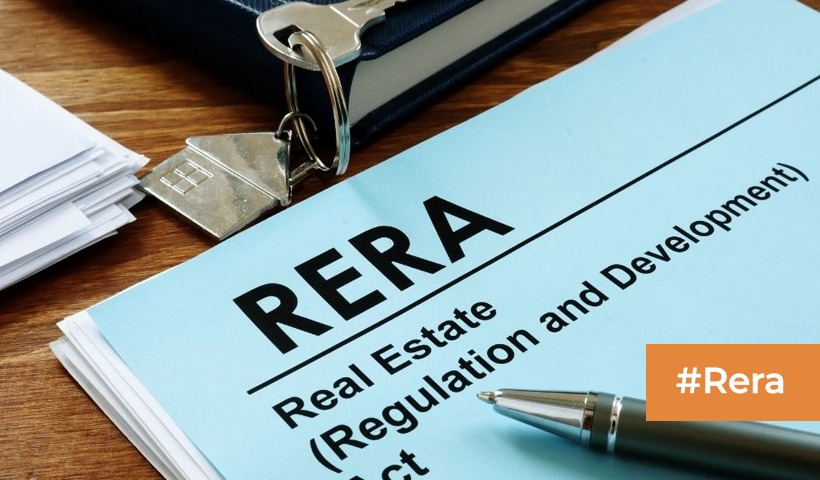Everything you need to know about the RERA Act
RERA is an act of the Indian Parliament. The RERA Act aims to safeguard the interests of home buyers and to encourage investments in the property sector. The RERA Bill was approved by the Parliament’s Rajya Sabha on 10 March 2016, after which it was approved by the Lok Sabha on 15 March 2016. The Act entered into force on 1 May 2016. 59 out of the 92 sections of the Act were notified on 1 May 2016, while the remaining provisions entered into force on 1 May 2017. The State Governments have to notify their rules under the RERA Act, based on the model rules laid down in the central Act.
Real Estate Regulatory Authority (RERA) is the regulator of the real estate sector. RERA was set up under the Real Estate (Regulation and Development) Act, 2016. The purpose of RERA is to protect the interests of allottees, ensure their responsibility, maintain transparency, reduce the risk of fraud, implement pan-India standardization, promote professionalism, improve the flow of proper information between home buyers and sellers, increase the accountability of both builders and investors and improve the reliability of the real estate industry, thus increasing the confidence of investors.
Home buyers have been complaining that real estate transactions are skewed towards the developers and not the buyers. In India, the RERA (Regulation and Real Estate Regulation) and the government’s model code aim to create a more fair and balanced transaction between the sellers and the buyers of properties, particularly in primary markets. It is hoped that RERA will make real estate purchasing easier by introducing greater accountability and transparency, as long as states do not compromise on the provisions and spirit of a central act. RERA will provide India’s first regulator of the real estate industry. Under the Real Estate Act, it is mandatory for every state and union territory to form their regulator and lay down the rules for the functioning of a regulator.
What are the benefits of the RERA Act?
Notifying recipients of small additions or changes and obtaining approval for any additional additions or changes from two-thirds of the allottees. No debut or promotion before RERA registration obtaining two-thirds of allottees’ approval before transferring controlling rights to outside parties exchanging details on the project’s structure and plan Government clearances and the state of land titles. Subcontractor encouraging projects to be completed on schedule and delivered to customers Raising the standard of building. Defect liability term of five years creation of an RWA within a predetermined window of time, or three months after the bulk of the units are sold. This law’s most advantageous feature is that it creates a consistent legal framework for purchasing flats, apartments, and other properties, to standardize the procedure nationwide.
Regulatory authority: The real estate sector has been without a proper regulator for a long time now (like the SBI for capital markets). The Real Estate Act establishes a real estate regulatory authority (REA) in every state and Union territory. The REA’s functions include protecting the interests of stakeholders, collecting data at a specific repository, and setting up a strong grievance redress system. To avoid time lag, the REA has been asked to clear applications within 60 days; the same can be extended if a reason for the delay is recorded. The REAT is the proper forum for appeals.
Under the central act, any real estate project (over 500 square meters or more than 8 units) that is planned to be developed at any stage must be registered with the relevant state’s Real Estate Regulation Authority (RERA). Existing projects that have not yet received a certificate of completion (CC) or a certificate of occupancy (OC) are also subject to the registration requirements of the Act. When you apply for registration, you will need to provide details about your project, such as land status, information about your promoter, approvals, timeline for completion, etc. Once registration is complete and other approvals related to construction are in place, your project can be put up for sale.
One of the main causes of project delays was that money collected from one project would always be used to fund new, unrelated projects. To avoid this, promoters now have to set aside 70% of project receivables in a dedicated reserve account. The money in this account will only be used for land and construction costs and will need to be certified by an expert.
Provision of regular updates by promoters: Once the Act is in place, home buyers will have the option to keep track of the project’s progress through the RERA website, as promoters will need to make regular updates to the regulator on the progress of their projects.
Title Representation: Promoters will now be required to make a good title and interest warranty on their right title and land, which can then be used against them by the home buyer in the event of a title defect. Insurance Coverage: Promoters will be required to get insurance coverage for the title and the construction of their projects, the proceeds of which will go to allottees once the agreement of sale is executed.
The Act requires homebuyers and promoters to enter into a standardized model sale agreement. Promoters often include punitive clauses in these agreements. These clauses penalized homebuyers for defaulting, while those who defaulted by the promoter were penalized with minimal or no penalties. However, such punitive clauses are likely to be phased out in the future, so homebuyers can expect more balanced agreements.
Disclaimer: The views expressed above are for informational purposes only based on industry reports and related news stories. PropertyPistol does not guarantee the accuracy, completeness, or reliability of the information and shall not be held responsible for any action taken based on the published information.




